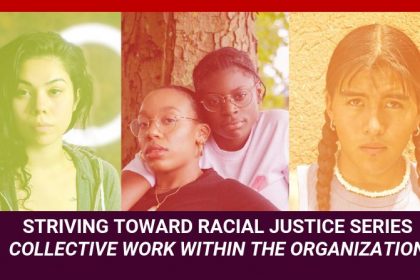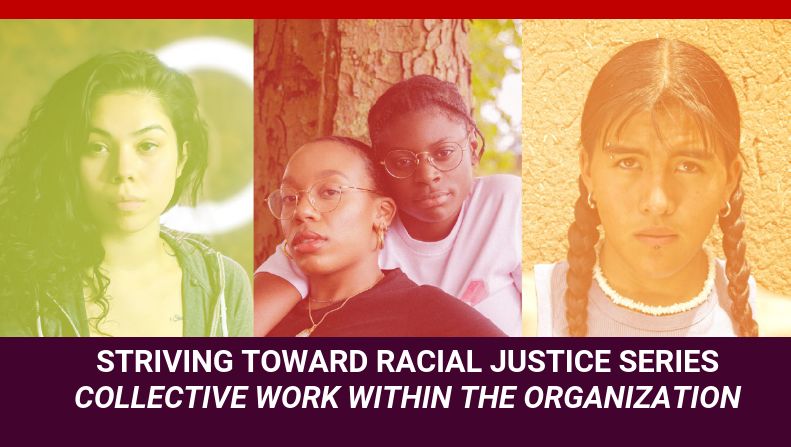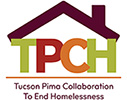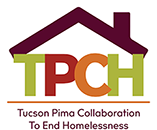

Striving Toward Racial Justice
Issue #4- Turning Inward
TPCH released Striving Toward Racial Justice: A Call-to-Action for Pima County Community-Based Organizations, in partnership with the University of Arizona Southwest Institute for Research on Women in November 2021. As we begin 2022, we are calling on community organizations and our housing partners to deepen our shared resolve to advancing racial equity. This email series provides a summary of key concepts and strategies discussed in the Call to Action and i packed with useful resources and tools to help community organizations as they strive toward racial justice.
In this issue, we introduce the second of 7 key actions defined in the Call to Action: Collective Racial Justice Work within our Organizations. This issue turns inward as we examine the roots of interpersonal and structural racism, and their stronghold within our organizations.
Don’t miss our next issue in which we introduce Action 3 – Individual Racial Justice Work. Can’t wait? Click here to download the full Call to Action now.
Action 2: Collective Racial Justice Work within the Organization
Combating Structural Bias and Systemic Racism in Organizations
Striving toward racial justice includes both interpersonal and structural efforts. These efforts can happen simultaneously, but one without the other will have less impact. There are many ways that White dominant culture has rooted itself in nonprofit organizations, and a thorough review of policies and practices using a racial justice lens is likely to uncover structural racism and/or areas of injustice.
Recommended Strategies
Organizational Policies
Revise Mission and Vision Statements to incorporate a racial justice lens.
Review all policy/procedural manuals with a racial justice lens.
Be truthful about the actual practices related to organizational policies and procedures.
Consider policies that impact staff and those that impact clients.
Challenge how policies may ignore specific cultures, identities, and communities.
Acknowledge how White supremacy may be entrenched in the organization.
Recruitment and Hiring
Evaluate hiring and firing policies and practices for racial bias.
Reconsider education requirements.
Consider who sits on organization hiring teams.
Review interviewing protocol and attempts to mitigate bias.
Make hiring processes transparent for all stakeholders.
Determine who decides what expertise is necessary for roles.
Organizational Leadership and Decision Making
Identify which staff members have been given opportunities for promotion and professional growth.
Examine how staff are promoted.
Explore how and why people are considered for desirable opportunities.
Ensure the racial/ethnic composition of boards, leadership and staff is representative of the people you serve.
Ensure there are enough staff who speak the languages of your clients.
Consider how the organization invests resources in the communities it serves.
Review your organizational chart.
Review the flow and direction of decision making.
Empower field experts to make decisions in their areas.
Examine the relationship between financial stakeholders and decision making to mitigate bias between budgets and needs of clients.
Reconsider alignment with funders and partners whose values are rooted in White supremacy.
Other Considerations
Survey clients and staff to identify areas of improvement.
Strategize about how to mitigate public backlash and protect stakeholders.
Examine the organization’s Human Resources department.
Question how problem-solvers may be problem-causers.
Strategize about how to protect people and avoid backlash.
Analyze client data based on race and ethnicity.
Involve clients and community members in the entire process and compensate them for their time and expertise.
Resources for Organizational Racial Justice Work
Asset-Based Community Development (ABCD): Core Principles
Ivis Garcia, Asset-Based Community Development Institute
How to Build Language Justice
Antena
Including Indigenous Perspectives in Your Organization
Kira Page, COCo
It’s Time for a New Approach to Racial Equity
Earl Fitzhugh, JP Julien, Nick Noel, and Shelley Steward, McKinsey & Company
L4G Competencies for High Quality Feedback Loops
Listen4Good
Race Equity and Inclusion Action Guide
Annie E. Casey Foundation
Racial Equity Core Teams: The Engines of Institutional Change
Terry Keleher, Government Alliance on Race & Equity
Racial Equity Network Toolkit
National Alliance to End Homelessness
Thinking Through Your Hiring Process
nene myriam konate, COCo
3 Ways to Decolonize Your Nonprofit as Told by a Black Queer Feminist Organizer
Neesha Powell
Authors
It is with the upmost admiration, respect and appreciation that we thank the authors for their critical contribution to this call-to action. In addition to their daily tireless commitment and relentless dedication to achieving racial justice in our community, they lent their expertise and passion to the hopeful notion that local organizations are willing to better serve their clients and better support their staff. Each of you makes our community a more just place.
Claudia Powell
Casey Chimneystar Limón-Condit
Marisol Flores-Aguirre
Anna Harper-Guerrero
Mildred Manuel
Andrés Portela III
Claudio Rodriguez

